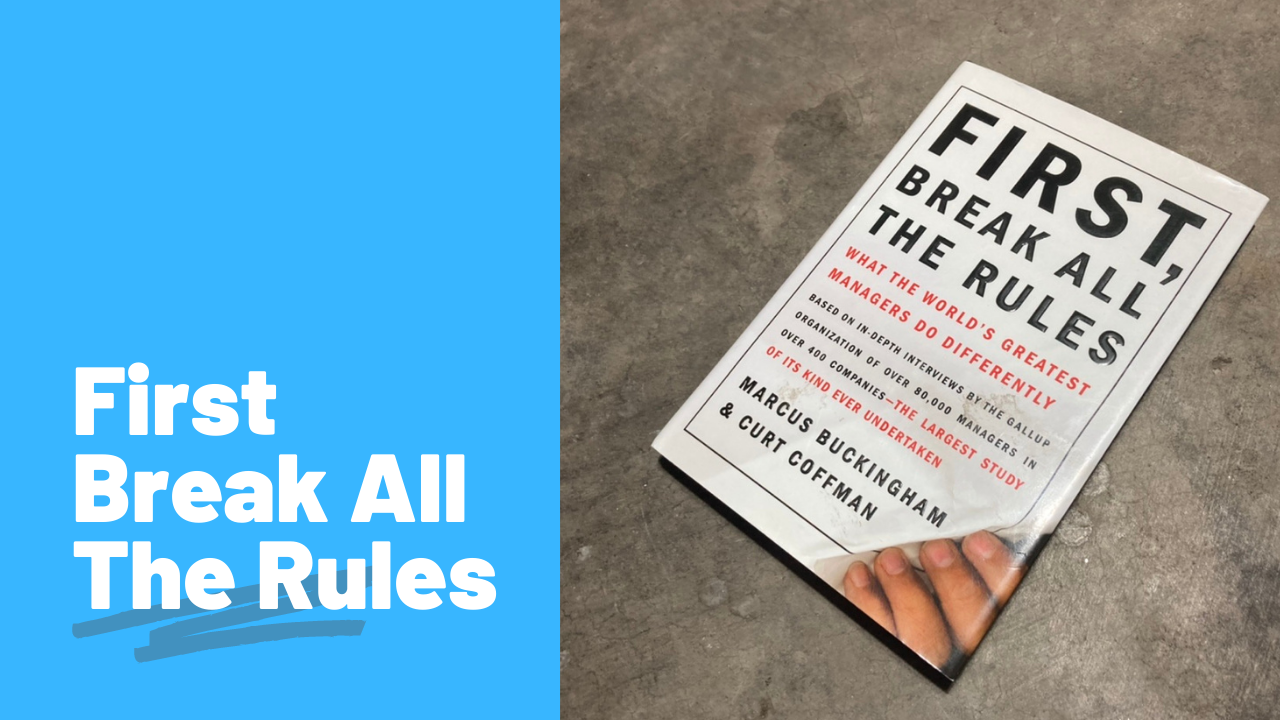I recently became the manager of a small web development team. While I've managed freelancer's off and on for 10 years, this is my first experience digging in with the same people over the long haul.
Of course I asked for some reading suggestions from experienced managers and one of the first recommendations was First Break All the Rules. It's been a few years since I read it, so let's take a look at the things I found interesting in this book.
Purpose and Structure
The purpose of the book is twofold1. First, what do the most talented employees need from their workplace? Second, how do great managers find talent, focus it on good tasks, and keep these talented employees.
The authors, Marcus Buckingham and Curt Coffman, found that there was a core 12 questions which contributed to workplaces that found, motivated and kept great talent2.
- Do I know what is expected of me at work?
- Do I have the materials and equipment I need to do my work right?
- At work, do I have the opportunity to do what I do best every day?
- In the last seven days, have I received recognition or praise for doing good work?
- Does my supervisor, or someone to work, seem to care about me as a person?
- Is there someone at work who encourages my development?
- At work, do my opinions seem to count?
- Does the mission/purpose of my company make me feel my on is important?
- Are my co-workers committed to doing quality work?
- Do I have a best friend at work?
- In the last six months, has someone at work talked to me about my progress?
- This last year, have I had opportunities at work to learn and grow?
Once they identify these questions, they spend the rest of the book helping you learn to get good answers for the questions in the people that report to you. They do this by identifying four key areas of focus.
Key 1: Select for Talent
The key take away is that a manager can't teach talent3. Instead look at finding the right match fit for the employee. We saw this discussed at length in Range by David Epstein. Epstein says that a great proxy for talent is to look at where a person demonstrates grit. This is likely where they are talented and where you should help them dig deeper.
Key 2: Define the Right Outcomes
Here Buckingham and Coffman tell managers that they shouldn't care about how something is done, unless there are legal reasons to have a process. Instead, focus on outcomes and let your people find their own way to the goal that has been set4.
Weak managers define methods and processes because it feels easier to be in control and because they don't trust their people5. These weak/bad managers are plagued by the thought that someone somewhere is taking advantage of them, so they must build regulations and enforce them to be sure this doesn't happen6.
Key 3: Focus on Strengths
Our third key is about finding what your people are good at and letting them do more of that7. Don't worry about fixing weaknesses, manage around them and support their weaknesses. This is how a CEO has an admin assistant when they are forgetful about appointments. Someone takes care of the stuff they're bad at so they can focus on the things they're excellent at.
The authors say that a manager should be able to describe in detail what the people they have working under them are best at8. If you can't do that, it's time to find out what they're best at and help them spend more time doing that thing.
Key 4: Find the Right Fit
Here the authors want to help us avoid The Peter Principle by helping managers adjust their compensation according to fit9. In most companies a software developer quickly maxes out their income and must start managing people to earn any more. This doesn't see if they're actually awesome at managing people and likely pulls them out of something they're truly awesome at, writing code.
The most interesting suggestion here is banded pay. So a top software developer earns less when they become a manager. Only after becoming a good manager do they start to earn more than they did as a developer. In their model it would also be entirely acceptable to move back "down" to a software developer and get that pay increase back.
When you remove the pay incentive from management, you will get only those that think they can be awesome managers.
Should You Read First Break All The Rules by Marcus Buckingham and Curt Coffman?
While I won't say this book is the end all be all read if you want to be an excellent manager, you're going to have lots more questions to ask of the people you manage after you've read this book. In particular, I'm currently focusing on being able to explain exactly what the people I manage are best at.
So yes, if you're starting to manage people then this is one of the books that should be on your list.
Purchase First Break All the Rules on Amazon
